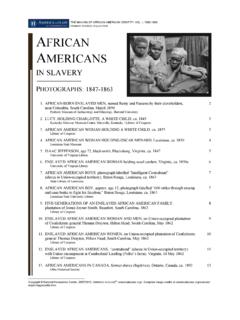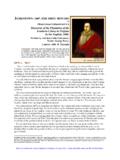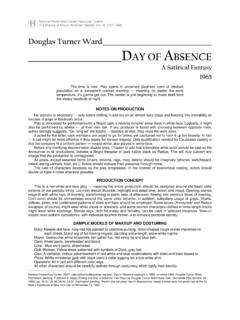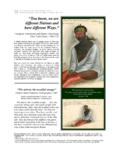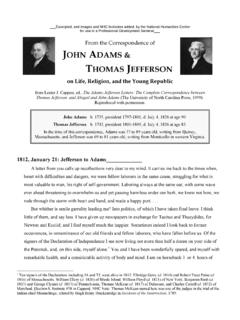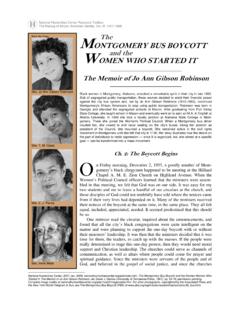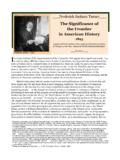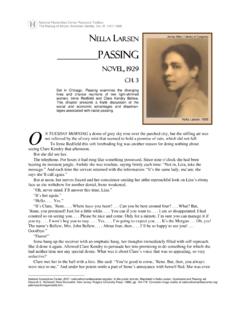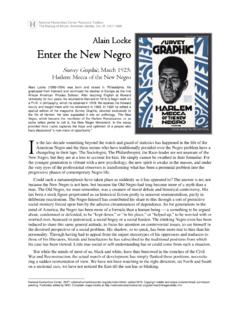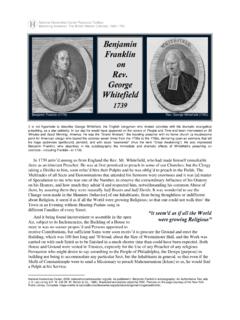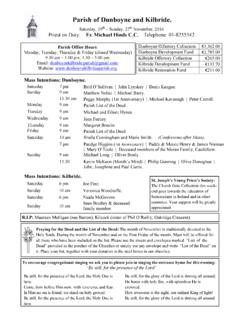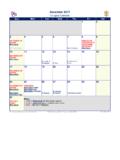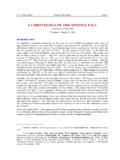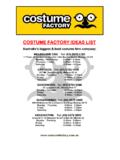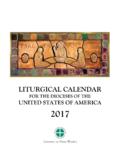Transcription of John Carter Brown Library, Brown University “THE …
1 John Carter Brown Library, Brown University THE FIRST IN THE INDIES . Columbus establishes the Town of Isabella on hispaniola , 1493*. Compiled from Spanish state papers by Antonio de Herrera y Tordesillas in Historia general de los hechos de los Castellanos en las islas y tierra firme del Mar Oceano (General History of the deeds of the Castilians on the Islands and Mainland of the Ocean Sea), Madrid, 1601-1615. Translated by John Stevens, 1740. Excerpts. _____. Columbus sailed on his first voyage with three ships and about 100 men, landing in the Bahamas on an island whose identity remains uncertain. After exploring the Bahamas and Cuba, he reached the island he named La Isla Espa ol ( hispaniola ).
2 When the Santa Maria became grounded, he ordered a small fort to be built with its salvaged lumber, named it La Navidad, and left about forty men to remain there until his return. On his second voyage in 1493, he sailed with seventeen ships and about 1200 men, arriving in hispaniola in late November to find the fort of La Navidad destroyed with no survivors. Near its ruins, on the northern coast of the present-day Dominican Republic, he founded the short-lived town of Isabella. Caribbean islands named by Columbus, THE ADMIRAL SETTLES THE COLONY. 1493: Ferna[n]da, Hyspana, Isabella, Salvatorie, and Conceptoi[ne] marie CALL'D ISABELLA IN THE ISLAND hispaniola .
3 The Admiral was now in the Port de la Navidad, of the Nativity, very thoughtful how to behave himself to give a good beginning to his enterprise; and thinking that the Province of Marien, where his Ships were riding, was very low land and had no stone or other materials for building, though it had good harbors and fresh water, he resolved to turn back along the coast to the eastward to find out a proper place to build a town. Accordingly on Saturday the 7th of December he sailed out with all the fleet and came to an anchor that evening near some small islands not far from Monte Christo, and the next day being Sunday, close under that mount; and fancying that Monte de Plata was nearer to the country of Cibao, where he had been informed the rich gold mines were, which he imagined to be Cipango [Japan], as has been said before, he was desirous to draw near that place.
4 He landed at an Indian village there was in that place and discovered a very delightful plain up the river, and observed that there might be trenches drawn from the river into the town for erecting mills and other conveniences Insula hyspana : Spanish islands, with a for building. Resolving to make a settlement there, he ordered fortified settlement, 1494 the men and horses to be landed, the latter being almost spoiled and the former quite tired. In this place he began to build a town, which was the first in the Indies, which he thought fit to call Isabella in honor of Queen Elizabeth [of Castile] whom he highly respected; and having met with proper necessaries of lime and stone and all he could desire, the soil being extraordinarily fruitful, he used the utmost diligence in building a church, a *.
5 Excerpted, images added, and spelling and punctuation modernized by the National Humanities Center, 2006: In John H. Parry & Robert G. Keith, New Iberian World: A Documentary History of the Discovery and Settlement of Latin America to the Early 17th Century (Times Books, 1984), Vol. II: The Caribbean, 188-203. Permission pending. Complete image credits at magazine, and a house for himself. He marked out plats for houses, with streets and squares. The public structures were built with stone, the rest of timber thatched, as every one was able. The men being fatigued with so long a voyage, most of them not used to the sea and the toil of that work ensuing upon it, being stinted in their allowance, and none liking the country bread, they began to sicken apace, the change of air contributing to it, though the country of itself is very healthy, and they died for want of conveniences, all being equally employed in the work.
6 Nor were they less afflicted for being so far from their native country, without any hopes of relief, or of that gold and immense wealth they had conceited they should meet with immediately. The Admiral did not escape, for as he had much fatigue at sea, the whole fleet depending on his care, so was his toil no less ashore, providing to order all things in such manner, that they might answer the hopes conceived of him in that important affair. And though he kept his bed, he pressed on the work of the new town, and to the end that no time might be lost, nor the provisions consumed without any advantage, he was desirous to know the secrets of the country and to find what his Cipango was, which so much misled him, because the Indians affirmed that Cibao was near by.
7 He therefore sent Ojeda with fifteen soldiers to view all parts, and in the meantime applied himself to send back twelve ships into Spain, keeping with him five of the largest, being two ships, and three caravels.. [Ojeda is well received by the Indians who lead him to nearby gold deposits. He returns with large gold nuggets to give to Columbus, who sends them back to Isabella and Ferdinand in Spain.]. THE GREAT UNEASINESS John Carter Brown Library, Brown University THE ADMIRAL HAD. WITH HIS MEN, AND. HOW MUCH THE. SPANISH SUFFERED FOR. WANT OF PROVISIONS. The ships being gone, and the Admiral recovered of his indisposition, was informed that some who repented of their undertaking that voyage, taking Bernal de Pisa for their chief, contrived to steal away or take by force the five ships that Map of hispaniola , in Summario de la generale historia de L'Indie Occidentali, 1534.
8 Remained, or at least part of them, to return into Spain. He ordered Bernal de Pisa be secured, and having drawn up the proceedings against him, to be put aboard a ship to be sent to the King. Some of the others he caused to be punished, and though he did it not with the severity that the case required, his enemies slandered him as a cruel man. For this reason he ordered the great guns, ammunition, and naval stores belonging to the four ships to be all laid up aboard the Admiral, Caribbean, 1634. National Humanities Center 2. under the guard of such persons as he confided in. This was the first mutiny contrived in the Indies, and the source of all the opposition the admiral and his successors met withal in those parts.
9 He set out from the Isabella on the 12th of March [1494], leaving his brother Don James [Diego] Columbus, whom he had carried over with him, to command in the town, that being a gentleman of a peaceable temper and exemplar behavior.. [Columbus explores the island and the settlements of the Indians who greet him with provisions and gold dust they had gathered. He discovers deposits of gold and copper and orders a fort, named St. Thomas, to be built.]. The Admiral returned to the [town of ] Isabella and arrived there the 29th of March. He found men much fatigued, many of them dead, and those that were in health very disconsolate for fear they should not long survive, and they sickened the faster as the provisions declined, and their [food] allowances were shortened, which was partly occasioned by much of it being spoiled, through the fault of the captains of the ships, and those that were landed found could not be long preserved because of the dampness and heat of the country.
10 The flour being almost spent, it was requisite to build a mill to grind the corn, and the laboring people being sick, the better sort were obliged to work, which was as bad as death to them, especially having little to eat. This misfortune obliged the Admiral to have recourse to force, that the men might not perish, for want of doing the public work. This gained him ill will and from hence Father Boyl began to be incensed, reproaching him with cruelty, though other[s] say his aversion proceeded from the Admiral's not allowing him and his servants as much as he thought fit. Thus their subsistence hourly failed, not only those that were in health, but even the sick, for among five that were under cure, they sometimes had not above an egg Library of Congress apiece, and a kettle of boiled garvanzos (a sort of Spanish peas much unlike the English) besides which there was a want of medicines, for though some had been carried over, they did not agree with all constitutions, and what was still worse they had nobody to help and nurse them.
